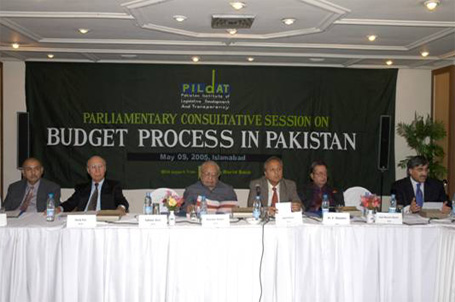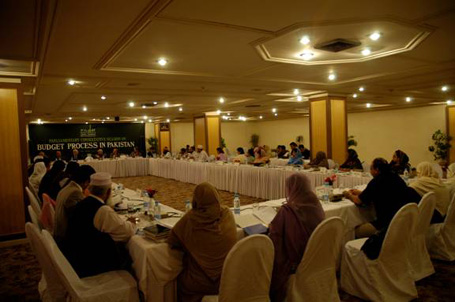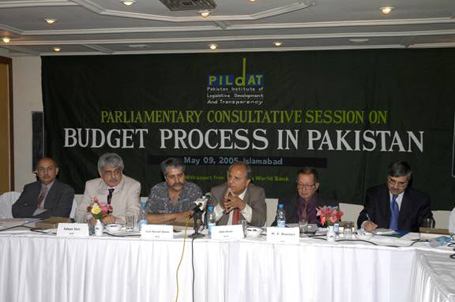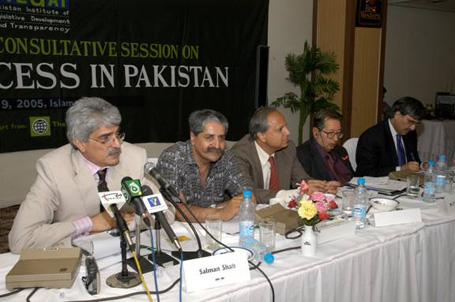|
|
| |
| EVENTS |
|
|
> Meaningful Involvement of Parliamentary Committees Critical for the
Budget Process
|
| |
|
Meaningful Involvement of Parliamentary Committees Critical for the
Budget Process
May 09, 2005
Best Western, Islamabad
Case Study [PDF]
[147 KB]
|
|
| |
The Parliamentary Consultative Session on the Budget Process in Pakistan, held by PILDAT on May 09, 2005, with support from the World Bank Country Office, witnessed a complete unanimity of views between representatives of major political parties that the involvement of the Parliament into the budget process remains superficial and urgent attention and political resolve is required to make parliamentary involvement a meaningful one in budget making and evaluation. |
|
| |
Thirty-five (35) MPs from all political parties including MMAP, PPPP, PML, MQM, and BNP participated in the consultative session. In addition, Parliamentary Interns attached with the Committees of the Senate, under a USAID project, were also participants at the session. A special Comparative Case Study of the Parliamentary Budget Process in Pakistan, India and Canada was prepared and published by PILDAT and was distributed to MPs as background information. (Click here to Download the Case Study)
|
|
| |
The speakers discussing improvements in the budget process included Mr. Sartaj Aziz, Former Finance and Foreign Minister (PML-N), who also chaired the first half of the consultative session; Mr. M. P. Bhandara, MNA (PML); Syed Naveed Qamar, MNA and Former Finance Minister (PPPP) and Senator Prof. Khurshid Ahmad, Chairman Institute of Policy Studies (MMAP). Mr. Abid Hasan, Operations Advisor World Bank Pakistan Office, spoke on the topic of What the Budget Process should entail. Dr. A. R. Kamal, Director Pakistan Institute of Development Economics � PIDE, and Advisor to Deputy Chairman Planning Commission, presented an overview of the upcoming Medium Term Development Framework. Dr. Salman Shah, Advisor to the Prime Minister on Finance presented an Overview of Budgetary Priorities of Government and engaged in a discussion with participating parliamentarians. |
|
| |
Speaking in the first half of the session discussing parliamentary involvement into the budget process, the speakers held that Parliament in Pakistan only plays the role of a rubberstamp in the budget process. With no involvement of Parliamentary committees into the budget process, neither at the time of recommending an allocation for a department or division, nor at the time of evaluation of the budget when it is laid in the Parliament, the passing of a budget merely becomes a ritual in which MPs from the government resort to saying yes and those from the opposition saying no at the time of passing the budget. This contrasts sharply with other democracies in the region and in the world in which not only Parliamentary committees play a vital role in budgetary proposals but also scrutinize and evaluate the budget before it is passed by the Parliament. |
|
| |
Offering his proposals to improve the budget process in Pakistan, Mr. M. P. Bhandara said that amendments in the rules of procedure and conduct of business of the National Assembly and the Senate were required to allocate a role to Parliamentary committees to evaluate the budget. He believed that the budget should be presented in the Parliament at least 75 days before it is due to be passed. |
|
| |
Agreeing with Mr. Bhandara, Syed Naveed Qamar believed that the colonial model of the current budget process in Parliament needs to be changed. Committees need to evaluate departmental budgetary proposals while after the budget is presented, a 10 days break should be there before general discussion in which committees should evaluate the budget in parts and bring their analysis and recommendations to the House. There is a whole sense of secrecy about the budget which is overplayed by the Finance Ministry, he added, although it is only the taxation proposals which demand that attitude. The current budget process is a complete circus without any real involvement of Parliament into it.
Senator Prof. Khurshid Ahmad believed that the discussion on this issue is not complete without putting in perspective the concept of the budget. The budget needs to be made keeping in view the state policy and it should follow the model of a planning and performance budget. Comparing the budget process in other parliaments of the world, he said that the budget process is of 4-months duration in Algeria, 31/2 months in Argentina; 21/2 months in Australia, 3 months in Belgium, 4 months in Brazil, 4 months in Denmark, 3 months in France and 4 months in Germany. He stressed that the budget process in Pakistani Parliament should also be of 4 months duration with a due role to committees. He also believed that unhealthy practices of Charged Expenditure, Supplementary Budget, SROs and delegated legislation need to be done away with.
Capping the discussion, Mr. Sartaj Aziz said that he did not think the budget process could be stretched longer without constitutional amendment and structural changes in the government functioning, but he believed that a more meaningful involvement of Parliamentarians into the budget could be ensured despite that. He suggested that the Finance Minister can present actual budget outcomes 3 months after the budget is passed., i.e., in October while committees can start work at that time evaluating departmental performances on that basis. From January to mid-year committees can examine the outlook of their division/ministry for the next year. He advised that committees can especially monitor the performance of their departments keeping in view the Millennium Development Goals, Human Development Index and other such measures. Moreover he felt that as a principle, budget can be presented 4 weeks before it can be passed in which it can be referred to committees.
During the second half of the session which was chaired by Syed Naveed Qamar, Mr. Abid Hasan said that while evaluating the budget, MPs could keep a certain checklist in mind. That checklist or yardstick, he suggested, should enable MPs to see whether the budget has a linkage between public expenditure and development goals, is the level of fiscal deficit sustainable, if the revenue assumptions are realistic, what are the expenditure priorities, what is the level of subsidies, is PSDP supporting high-return projects, the hidden deficits are identifiable and what will be the value for money and impact of services, etc. He also emphasized that the budget should be reader-friendly in which average educated person should be able to understand the budget. Mr. Abid Hasan also suggested that such a session should also be held by PILDAT for Parliamentarians after the budget is laid so that experts can evaluate the budget for them.
Outlining the major aspects of the upcoming 5-year plan, Dr. A. R. Kamal said that increase in public sector investments and FDIs is expected. GDP is expected to be at 7.5%. Saving stand at 18% for now but are expected to increase by 24%. Major emphasis of the plan is on PSDP which is to grow by 7%.
Presenting an outline of the Medium Term Development Goals of the government, Dr. Salman Shah said that in the medium term, one of the major objectives of the government is to sustain that growth rate. Five major areas in this regard include harnessing human resource growth; improving and providing education; provision of basic facilities such as water, electricity, roads; development of local entrepreneurship through �one village one product plan,� and infrastructural and growth increase.
The session concluded with interaction between Parliamentarians and Dr. Salman Shah on issues such as improving the budget process and regular involvement and input of MPs into identification of budgetary priority areas. The session ended with the note and demand from MPs that such avenues of regular consultation with MPs should be made a part of budget process.
|
|
| |
|
|
| |
|
|
| |
|
|
| |
|
|
| |

(From Left to right) Dr. A. R. Kamal, Mr. Sartaj Aziz, Senator Prof. Khurshid Ahmad, Mr. Abid Hasan, Mr. M. P. Bhandara and Mr. Ahmed Bilal Mehboob |
|
| |
|
|
| |

Participants at the Consultative Session |
|
| |
|
|
| |

(From Left to right) Dr. A. R. Kamal, Dr. Salman Shah, Syed Naveed Qamar, Mr. Abid Hasan, Mr. M. P. Bhandara and Mr. Ahmed Bilal Mehboob |
|
| |
|
|
| |

Dr. Salman Shah addressing the Parliamentarians |
|
|
|
|
|
|
|
|